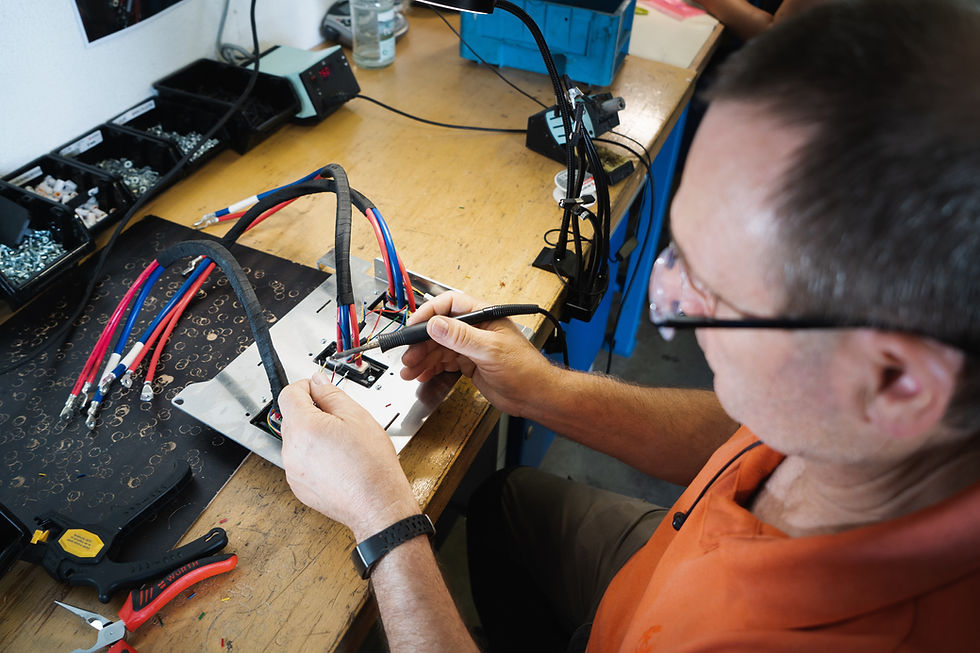How to Choose the Right Electrical Safety Trainer
- Adam Brooks

- Jun 16, 2025
- 3 min read
Updated: Jun 20, 2025
What really makes an instructor effective?

If you’re wondering what to look for in an electrical safety trainer, especially if you’re not an electrical expert yourself (perhaps you work as a safety manager, HR leader, or facility director), this article is for you.
The quality of your trainer doesn’t just affect how engaging the class is; it affects how much your team remembers, how seriously they take electrical safety, and ultimately, how safe they’ll be on the job. Anyone can read through a standard, but at the end of the day it’s the practical application that matters.
Here’s what we recommend you look for.
Practical, Hands-On Experience
Electrical safety isn’t theoretical. The best trainers have hands-on experience doing similar work to the students.
As Director of Training, Brian Hall puts it:
“If all I’m going to do is read you the book, you don’t need me. The real value is knowing how to apply the rules to stay safe.”
Look for instructors who have:
Spent years in the field (not just the classroom)
Worked in a variety of environments (plants, substations, maintenance)
Encountered real hazards and learned from them
Their firsthand knowledge gives your team access to practical tips they can’t get from a codebook alone. They understand the issues and can bridge the knowledge gap.
Memorable, Real Stories
Everyone has sat through a class that was technically correct but completely forgettable.
That’s why connecting through stories is just as important as knowing the standards. A great safety trainer:
Speaks the language of the people doing the work
Shares relevant stories to make the risks real
Explains complex standards in plain language
As our own Jeff Kershner put it:
“You can read the code yourself. You need a trainer who tells you what it means and how to apply it correctly.”
Stories stick. And when workers remember a story in a critical moment, it could save a life.
Credentials That Show Technical Expertise
Yes, experience and communication matter—but technical qualifications are also essential.
Look for:
Certified Electrical Safety Compliance Professional (CESCP) designation
Experience interpreting NFPA 70E, NFPA 70B and OSHA electrical safety standards
A track record of performing or supervising real electrical work
Just remember: credentials don’t mean everything. As Brian shared, “The crucial part is: does the instructor make electrical safety practices immediately understandable and applicable?”
Engaging, Human, and Approachable
Training should never feel like punishment. The most effective instructors:
Bring energy to the room
Read the class and adjust to keep attention
Make people feel safe asking questions
You want someone your team will trust and listen to. That trust makes it easier to speak up when something feels off in the field.
A Personal Commitment to Safety
This may be the most important quality of all: a deep, personal reason to care.
Many of our trainers have had near misses or have seen coworkers get hurt. Some, like Brian, have built their careers around ensuring others don’t experience the same.
That level of commitment comes through in every class. Our trainers will get up at 2 AM to deliver a session if the client needs it. And it’s why they’re consistently rated five stars by companies nationwide.
How to Spot the Right Trainer for Your Team
Check reviews. What do people say about their classes?
Look at their background. Have they done the work your team does?
Ask about their approach. Do they personalize the training or stick to scripts?
Remember, electrical safety training isn’t just about compliance; it’s about protecting lives.
When it comes time to choose a trainer, don’t settle for a lecturer. Choose someone your team can relate to. Someone they’ll listen to. Someone who’s walked in their boots and cares that they go home safely each day.



